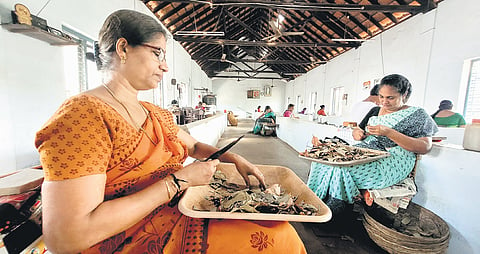

KANNUR : They were once the backbone of the revolutionary movement in communist party strongholds, and committed party workers who enthusiastically filled election rally venues. In fact, Dinesh Beedi’s units in Kannur used to be where work and loud reading sessions of newspapers as well as serious political discussions went hand in hand.
It’s election season now. However, the beedi companies in the district wear a forlorn look. Sandwiched between a glorious past and uncertain future, they are struggling for survival.
For the workers, the Lok Sabha elections present an opportunity to retaliate against the Union government which, they feel is responsible for the destruction of their industry through the implementation of the Goods and Services Tax (GST).
“GST made our company lose its grip on the market. We have to pay around 28% of our yearly profits as GST to the Centre. There was a time when we lived like government employees. However, for the past few years, our condition has been pathetic. The industry is dying a slow death. This election is our chance to mark our protest against the Union government,” says Sajeevan, a worker.
Savithri P V, a beedi worker for 36 years, reminisces, “I joined Dinesh beedi when I was 18. For the past 36 years, I have been spending my days making beedis.”
She says all the workers there are the same age. “There once were a total of 40,000 workers in all the units. Now, we have only 2,700. It was like a government job. We married off our children like proud government employees. Things are different now,” laments Savithri.
In the same breath, Savithri says while it is easy to talk about the industry’s glorious past, the governments should think about its future.
“Beedi has good market, but lack of assistance from governments is making us vulnerable. Had the Centre implemented a special package for the industry instead of the burdensome GST policies, our story would have been different. Our highest weekly wage is Rs 2,000, and varies worker to worker. How will we live on this income,” asks Savithri.
She says: “We have several questions to ask the government. Whoever wins in Kannur should raise our issues before the Centre.”
Discussing the political landscape in Kannur, Sreejan Thoniyath, another worker, says, “We all have our own politics. It is what leads us. Both K Sudhakaran and M VJayarajan are strong candidates. It’s difficult to predict the winner now. I used to go for election campaigns earlier, but now it feels like I have lost the touch. I have several life troubles to focus on.”
With nearly 90% of Dinesh beedi workers being women, their concerns extend to the state government. “I’m a 54-year-old widow. My family cannot survive on just my wage. I have to feed my family and provide good education to my children. My widow’s pension was a huge relief but it took the government seven months to pay me one month’s pension in March. All of us here are party supporters. However, the realities of our life will definitely dictate our choices in the polling booth. This is not a threat to any party. This is what life has turned us into,” says worker Sreeja V.
The Dinesh Beedi industry faced a significant blow in the early 1990s with the onset of the anti-tobacco movement in India.
Dinesh Babu, the chairman of Dinesh Beedi, says, “We can’t promote beedi like a soft drink. Encouraging people to smoke beedis became a challenge and hit our our business. To combat the crisis, we diversified and now boast seven business arms under the Dinesh umbrella. While the ventures show promise, the beedi industry’s future appears bleak. If the current trend continues, the industry may not survive another decade.”